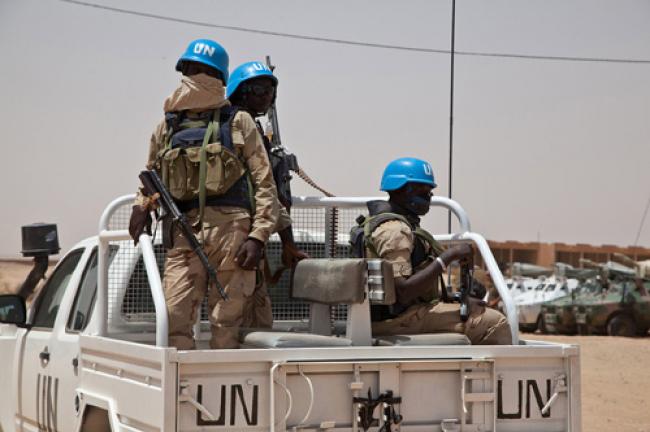26 Jun 2014, 04:45 pm Print

Expressing its ongoing concern over the fragile security situation in the North of Mali and the continuing activities in the Sahel region of terrorist organizations, the Council extended for one year the mandate of the UN Multidimensional Integrated Stabilization Mission (MINUSMA) through 30 June 2015. It maintained the Mission’s mandate of stabilizing, security and protecting civilians; supporting national political dialogue and reconciliation; and providing support to State authority.
Among its specific tasks, the Council urges the Mission to expand its presence “in the North of Mali beyond key populations centres,” notably in areas in the where civilians are at risk. In that light, the council ‘strongly condemned” the violent clashes in Kidal on 17 and 18 May 2014, in the context of the Malian Prime Minister's visit, which resulted in the death of Malian Defence and Security Forces personnel, as well as eight civilians, including, six Government officials.
Despite initial improvements in 2013, the situation in northern Mali has deteriorated since the beginning of 2014, Secretary-General Ban Ki-moon wrote in a report that Under-Secretary-General for Peacekeeping Operations, Hervé Ladsous, presented to the Security Council last week.
He highlighted that all aspects of stabilizing Mali, including the restoration of State authority, the re-establishment of security and the protection of civilians, remain contingent on the successful conclusion of peace talks between the Malian Government and northern armed groups in the framework of the Ouagadougou Agreement.
Signed on 18 June of last year in Ouagadougou, capital of Burkina Faso, between the Tuareg rebel groups from northern Mali and the Government, the agreement allows the Malian regular army, as well as its civil administration, to gradually return to the region of Kidal, held by rebels since 2012. The accord was also co-signed by the representatives of the UN, African Union (AU), European Union (EU), and the Organization of Islamic Cooperation (OIC).
Among its priorities, the renewed mandate directs MINUSMA to provide support to the activities of the international commission of inquiry, as envisaged in the Ouagadougou Agreement and the ceasefire agreement on 23 May of this year. It also instructs the UN to exercise its good offices, confidence-building and facilitation at the national and local levels to anticipate, prevent, mitigate and resolve conflict.
Mr. Ban is requested to report to the Security Council within three months on the implementation of the Ouagadougou Preliminary Agreement, the expansion of MINUSMA’s presence in the north, and benchmarks to assess progress on the implementation of the mandate.
Among additions to the mandate, the Council tasked MINUSMA with protecting UN personnel, installations and equipment, and with ensuring “the security and freedom of movement of United Nations and associated personnel.”
Another new element in the draft text is the Council’s request to the Secretary-General to “facilitate the swift establishment” of the commission of inquiry envisaged by the ceasefire agreement of 23 May.
The Council also added a new provision to the mandate requesting the Mission to support cultural preservation. In specific, to assist the Malian authorities, in collaboration with the UN Educational, Scientific and Cultural Organization (UNESCO), to protect from attack the cultural and historical sites in Mali.
MINUSMA will be up to 70 per cent of its envisaged civilian strength by the end of the month, 77 per cent of its military strength and 83 per cent of its police strength, the UN has said.
Earlier today, the Security Council extended the mandate of the UN Operation in Cote d’Ivoire (UNOCI) until the end of June 2015 to continue work on its core priorities of protecting civilians, political support, disarmament, demobilization and reintegration of former combatants, and security sector reform.
Members also agreed that the Mission should be reconfigured to consist of up to 5,437 military personnel from the current limit of 7,137. The Council made it clear that it would consider further downsizing of the Mission ahead of its possible termination after the October 2015 presidential election, depending on security conditions on the ground and the capacity of the Government to take over UNOCI’s security role.
Also today, the Council renewed for six months the mandate of the UN Disengagement Observer Force (UNDOF), until 31 December 2014. The Mission, established in 1974 to monitor the ceasefire between Israel and Syria, is also on the lookout against a potential spill over of the conflict in Syria.
The 15-member Council has called on the parties to the conflict to exercise maximum restraint and prevent any breaches of the ceasefire and the area of separation, and underscored that there should be no military activity of any kind in the area of separation, including military operations by the Syrian Arab Armed Forces.
The approved resolution also urges Member States to convey strongly to the Syrian armed opposition groups in UNDOF’s area of operation to halt activities that could endanger UN peacekeepers and UN personnel, and to allow them the freedom to safely and securely carry out their mandate.
UN peacekeepers on patrol in Kidal, Mali. Photo: MINUSMA/Blagoje Grujic
- Pakistan: Police recover two bullet-ridden bodies from Balochistan
- IDF strikes Hezbollah targets in Lebanon after projectile fire toward Northern Israel; 31 killed
- Pakistan: Armed gunmen kidnap 14 workers during coordinated raids in Balochistan
- ISIS-inspired plot foiled in UK: Two men get life sentences for targeting Jewish community
- India rejects allegations, urges Pakistan to tackle its ‘home-grown ills’





-1763561110.jpg)
